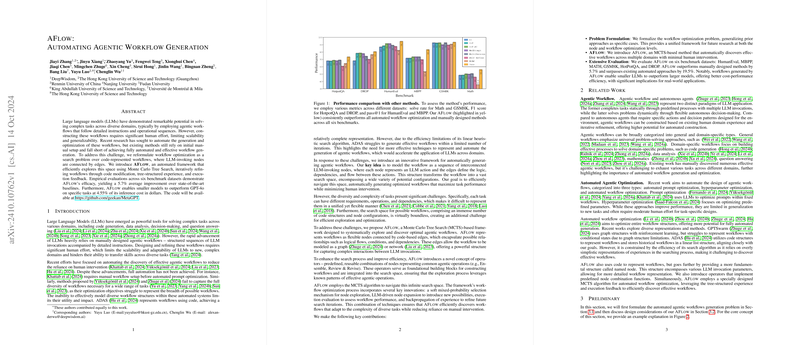Automating Agentic Workflow Generation
In the context of evolving AI technologies and their applications, the automation of agentic workflow generation presents a significant research contribution. This paper addresses a crucial limitation in the effective deployment of LLMs: the necessity of human intervention in designing and optimizing workflows tailored to complex tasks. The authors propose a novel framework to automate this process, utilizing a Monte Carlo Tree Search (MCTS)-based approach to systematically explore workflow configurations.
Methodology
The proposed framework reframes workflow optimization as a search problem over code-represented workflows where LLM-invoking nodes are linked by edges. Each node corresponds to an LLM action with parameters including model type, prompt, temperature, and output format. The search space encompasses all potential nodes and edge configurations, conceptualized as a graph or network that captures intricate inter-node interactions.
To efficiently explore this vast search space, the authors introduce as a Monte Carlo Tree Search-based framework, complementing it with predefined operators as foundational blocks. The key innovation here is the integration of operators, allowing workflows to be assembled from known effective patterns, hence improving search effectiveness.
Empirical Evaluation
The framework's efficacy has been empirically validated across six benchmark datasets, including GSM8K, HumanEval, MBPP, MATH, HotPotQA, and DROP. results demonstrate a 5.7% improvement over manually designed workflows and surpass existing automated solutions by 19.5%. More notably, the discovered workflows enable smaller LLMs to achieve performance comparable to larger models such as GPT-4o, at a fraction of the inference cost.
Implications
The implications of this research are twofold:
- Practical Impact: The framework reduces human effort in workflow design, making LLMs more adaptable across various domains. The ability to leverage smaller, cost-effective models without sacrificing performance significantly increases the accessibility of advanced AI solutions.
- Theoretical Foundations: The paper sets a precedent by formalizing the workflow optimization problem in a general framework. This foundation can inspire further research into automated systems and extend to other domains where workflow efficiency and adaptability are critical.
Future Developments
Future research could focus on broadening the operator set and improving the efficiency of the MCTS approach. Additionally, exploring other optimization algorithms or hybrid approaches could further enhance the adaptability and performance of automated workflow systems. The ability for frameworks like to autonomously generate complex workflows hints at a move towards truly automated AI systems, necessitating continuous advancements in understanding the structural intricacies of agentic workflows.
In summary, this paper presents a substantial step forward in the automation of agentic workflows for LLMs, offering both practical benefits and a robust theoretical framework for future developments in AI efficiency and adaptability.
